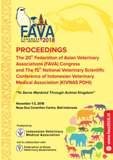PF-4 Immune Response of Dry Holstein Vaccinated by Killed Avian Influenza H5N1 Vaccine
Abstract
The establishment and spread of highly pathogenic avian influenza (HPAI) viruses of the H5N1 subtype in birds and coincident infections in humans since 2003 have raised concerns that we may be facing an influenza pandemic caused by an H5N1 influenza virus [4]. Globally, from January 2003 to 2 March 2017, there were 860 cases of human infection with avian influenza A(H5N1) virus reported from 16 countries worldwide. Of these 860 cases, 454 were fatal (CFR of 53%). The last case was reported from Indonesia on 26 September 2017 [7]. Although the human cases of H5N1 in Indonesia has decreased significantly since 2010, according to WHO until 2017 there have been reported 200 cases H5N1 in human with 168 cases of deaths. The last case was reported from Indonesia on 26 September 2017. This is indicate Indonesia as the highest fatal case of H5N1 globally. With continued incidence of avian influenza due to existing AI H5N1 viruses in poultry, the avian influenza H5N1 has been believed remain to threaten Indonesia [6].
Passive immunization using specific antibody against AI H5N1 from bovine colostrum is one of an alternative to control H5N1 virus infection due to lack of H5N1 vaccine production for human. Bovine colostrums consider an ideal alternative antibody source, as the antibody in the bovine’s blood is transported to mammary gland easily and accumulates in the colostrum in large quantities. As a “biological factory” and the source of natural antibody, bovine colostrum could be designed to produce the specific antibody against certain disease for animal and human by immunizing the dry cow (with the antigen of interest).
Vaccine is an antigenic material used to produce active immunity against diseases. Vaccination is the administration of vaccine to the individual to generate immunity against a disease [2]. According to [1], the exposure of a dry cow against antigen (vaccine) will produce specific antibody in their blood circulation. Therefore, evaluation on the status of antibody against AI H5N1 following the vaccination of dry Holstein cows with killed AI H5N1 vaccine is needed.

